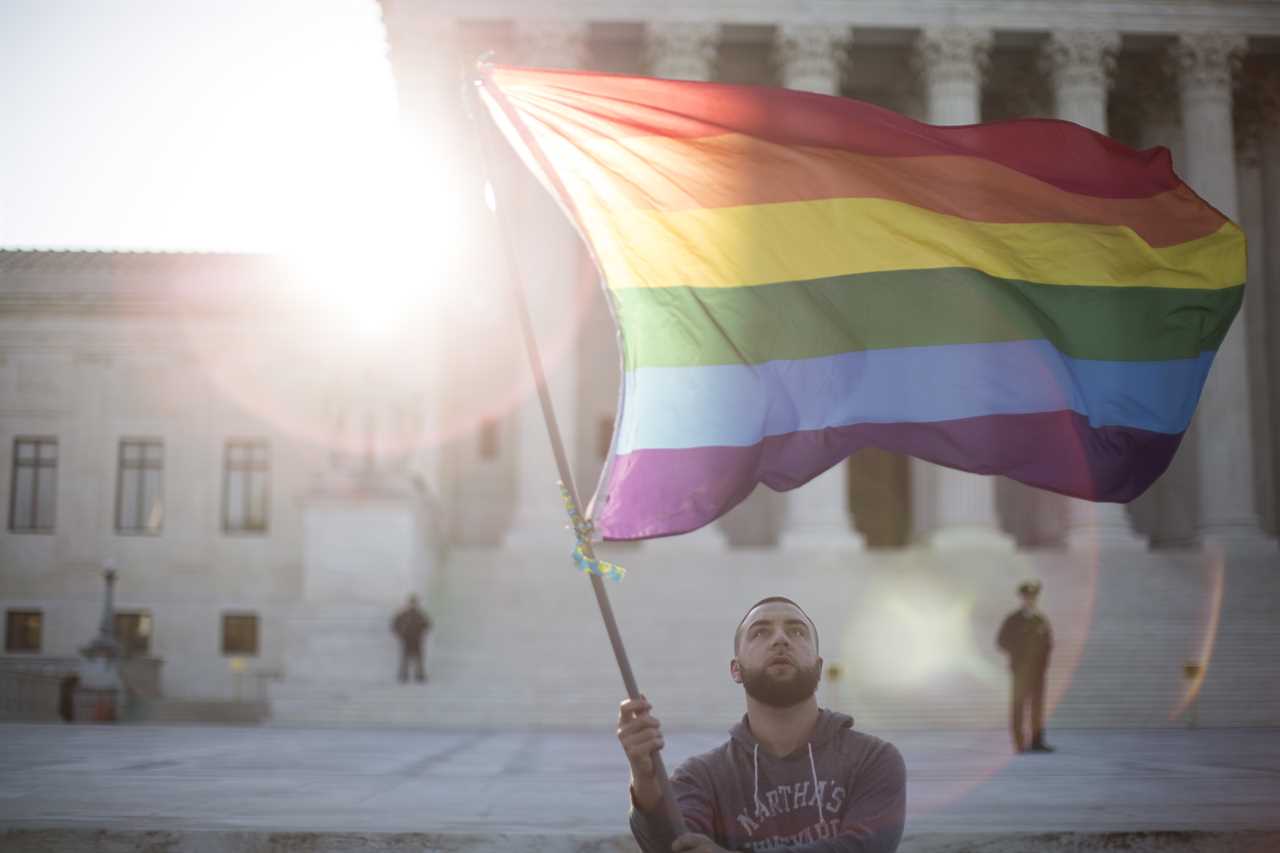
LGBTQ voters are poised to become one of the fastest-growing blocs in the country, according to a report first shared with POLITICO.
The research, conducted by the Human Rights Campaign and Bowling Green State University and based on data from the U.S. Census Bureau, finds that by 2030, approximately 1-in-7 voters will be LGBTQ. The researchers expect to see that share grow to nearly 1-in-5 by 2040.
Ahead of the midterm election this year, 11 percent of the voting-eligible population identifies as LGBTQ. The projections are a conservative estimate, the researchers noted, because more people continue to come out as they age.
The report suggests that momentum is driven by the growing number of youth voters and more people coming out in younger generations. Nationally, Gen Z has the highest share of those who are LGBTQ — 27 percent — followed by millenials, with 16 percent who identify as LGBTQ. In 2020, youth turnout was 11 points higher than the previous presidential election, and 17 million young people have turned, or are turning, 18 between the 2020 election and the 2022 midterms.
“It is safe to assume that LGBTQ+ Americans are, and will increasingly continue to be, an important voting bloc in American elections,” the report says.
LGBTQ voters had a historically high turnout in the 2020 presidential election, representing an estimated 7 percent of the electorate. In the 2018 midterms, that was 6 percent.
Issues involving LGBTQ rights, abortion access and voting access are driving these voters to the polls this year, said Geoff Wetrosky, the Human Rights Campaign’s national campaign director. A Human Rights Campaign survey from earlier this year found 42 percent listed immigration policy reform as a top issue when choosing who to vote for. Another 22 percent cited crime rates in their local areas.
Republican campaigns are relying heavily on messaging this cycle about crime and immigration. Exit polls from previous elections show that the majority of voters who identify as LGBTQ are Democrats. And Wetrosky said there is a stark partisan divide in terms of who LGBTQ voters support.
“But our hope is that as politicians of all political parties recognize the changing demographics of the country, and the growth of the LGBTQ voting bloc and the growth of our number of pro-equality allies, that they too will support pro-equality policies,” he said.
The Senate is voting on legislation to protect same-sex marriage after the election, a delay that senators supporting the deal say will increase its chances of passage. But it does mean Republicans will be able to skirt their records on the issue before the midterms.
“The LGBTQ voting bloc does not act as a monolith, and we do not necessarily only support Democrats, we support pro-equality candidates,” he continued. “We hope that candidates of all parties will recognize that and support pro-equality policies and reach out to LGBTQ voters and seek our votes.”
The LGBTQ vote can have an impact in battleground states, the report suggests. In both 2030 and 2040, the percentage of eligible voters who are LGBTQ is projected to exceed the national average in Georgia, Arizona, Texas, Nevada and Colorado. Ohio is projected to have the highest percentage change, jumping from 10 percent in 2020 to 18 percent in 2040.
Earlier this year, Agenda PAC, a new liberal super PAC, launched to defeat anti-LGBTQ candidates — with one of the first being Doug Mastriano, the Republican candidate for Pennsylvania governor. Mastriano has said that LGBTQ couples should not be allowed to adopt children, gay marriage should not be legal and transgender females should not be permitted to compete in women’s sports.
Other candidates in battleground races have also spoken out against LGBTQ issues. Amid reports that Republican Herschel Walker in the Georgia Senate race paid for a previous partner's abortion — which he has denied and POLITICO has not independently verified — he has said he supports Georgia’s abortion law, which bans abortion in most cases after fetal cardiac activity is detected, usually after about six weeks of pregnancy. Over the summer, he would not say if he would vote to write same-sex marriage into law.
“This would be a political earthquake across the country, particularly with a state like Texas — having this huge LGBTQ population, a growing number of allies as well, in the state looking for pro-equality politicians that at the statewide level in particular, are not currently seeking the votes of LGBTQ voters by supporting pro-equality policies,” Wetrosky said.
Just last week, a federal judge ruled in favor of Texas and halted implementation of two Biden administration rules concerning LGBTQ protections for employees and children. Last year, Texas Attorney General Ken Paxton filed a lawsuit against the rules. Biden has condemned these moves made by Republican Texas Gov. Greg Abbott’s administration.
“The Biden Administration’s attempts to radicalize federal law to track its woke political beliefs are beyond dangerous,” Paxton said in a statement following the ruling. “I will continue to push back against these unlawful attempts to use federal agencies to normalize extremist positions that put millions of Texans at risk.”
Recent polling finds Abbott ahead of Democratic challenger Beto O’Rourke. POLITICO forecasts the race as likely Republican.
“These states and these leaders [are] on the wrong side of history, but I think they're really on the wrong side of the demographics, even,” said Shoshana Goldberg, lead author of the study and director of public education and research at the Human Rights Campaign Foundation. “Just the basic numbers suggest that where these states are going versus where their states' politicians think that they're going, suggests a pretty big mismatch.”
----------------------------------------
By: Madison Fernandez
Title: Report projects major growth in LGBTQ voters in coming decades
Sourced From: www.politico.com/news/2022/10/13/report-projects-major-growth-in-lgbtq-voters-in-coming-decades-00061553
Published Date: Thu, 13 Oct 2022 04:45:00 EST
Did you miss our previous article...
https://consumernewsnetwork.com/politics-us/south-dakota-marks-the-end-of-an-era-in-medicaid-expansion






